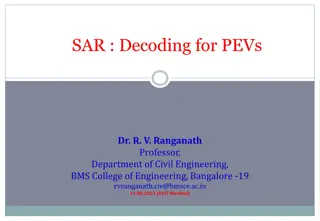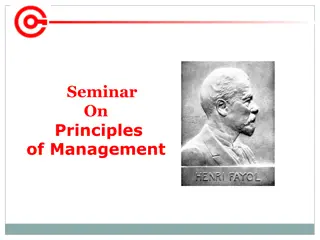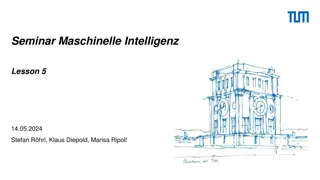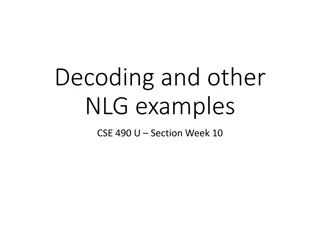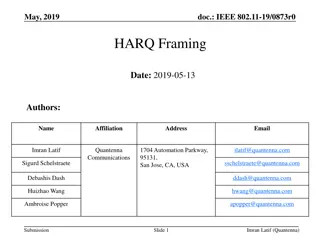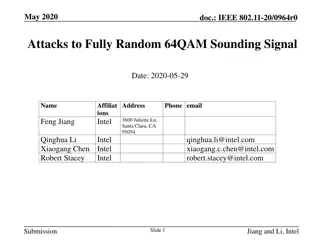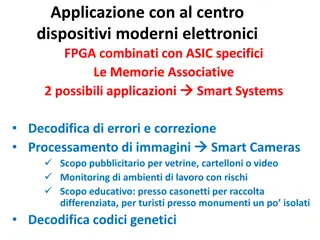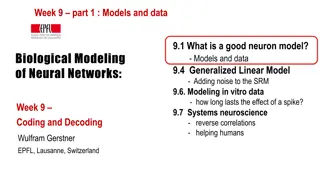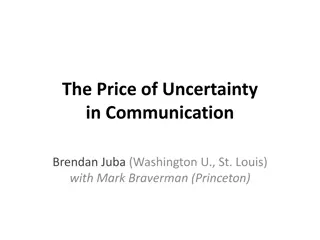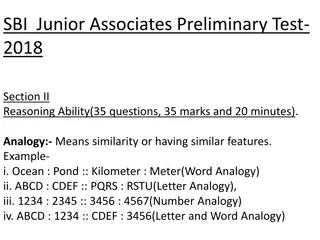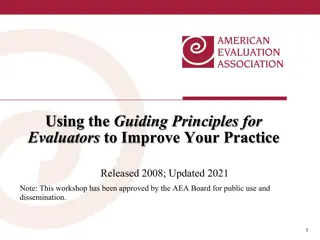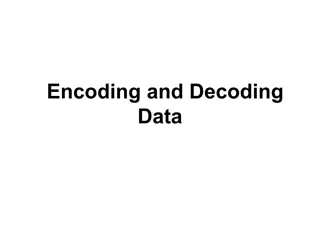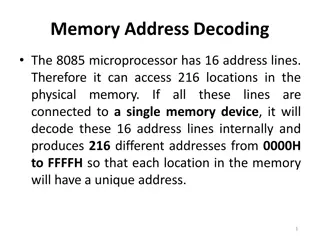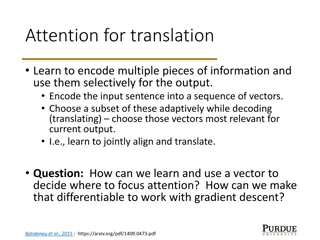SAR : Decoding for PEVs
This document provides detailed information on SAR decoding for Program Educational Videos (PEVs) at BMS College of Engineering in Bangalore. It covers key criteria such as institutional information, program-level details, faculty contributions, student performance, facilities, and continuous improv
0 views • 168 slides
SAR Decoding for PEVs by Dr. R. V. Ranganath at BMS College of Engineering, Bangalore
SAR Decoding for PEVs involves providing preparedness status for the NBA visit, presenting program status to the evaluation team, and documenting evidences to support the program assessment process. The SAR includes institutional and program level criteria, faculty information, facilities, continuou
0 views • 168 slides
Principles of the Ghana Civil Service Code of Conduct
The Code of Conduct for the Ghana Civil Service, outlined by Elizabeth Obeng-Yeboah, emphasizes principles such as abiding by the constitution and laws with dignity, integrity, and professionalism. It sets standards for conduct, avoiding conflicts of interest, maintaining political neutrality, and u
1 views • 34 slides
Decoding SAR for PEVs by Dr. R. V. Ranganath - BMS College of Engineering
Decoding SAR (Self-Assessment Report) for PEVs (Program Evaluation Visits) provides a comprehensive overview of preparedness status, program criteria evaluation, and institutional information by Dr. R. V. Ranganath, a Professor at BMS College of Engineering in Bangalore. The report covers aspects su
7 views • 166 slides
Understanding Decoders in Digital Electronics
Decoders play a vital role in digital electronics by converting coded inputs into meaningful outputs. They are essential for tasks like data multiplexing, memory address decoding, and driving displays. This summary provides insights into the working principles, applications, and types of decoders co
3 views • 16 slides
Academic Freedom and Shared Governance in Higher Education
Academic Freedom and Shared Governance are foundational principles advocated by the American Association of University Professors (AAUP) to ensure educators have the freedom to explore, research, teach, and discuss without censorship. These principles empower educators to enhance student learning an
0 views • 9 slides
Essential Principles of Management Discussed in Seminar
Explore the foundational principles of management discussed in a seminar on principles of management. Delve into topics such as division of work, authority, discipline, unity of command, and unity of direction as outlined by Henri Fayol. Gain insights into the importance of these principles for effe
0 views • 22 slides
Seminar on Machine Intelligence: Brain Decoding and Collaborative Discussions
The seminar on machine intelligence covered topics like brain decoding for visual perception reconstruction and collaborative group discussions. Participants engaged in analyzing research papers, understanding complex concepts, and exploring implications and limitations of the work. Activities inclu
0 views • 4 slides
International Law of War: Nuremberg Principles and Accountability
The Nuremberg Principles, derived from the trials of Nazi officials for war crimes, establish accountability in international law. These principles hold individuals responsible for committing acts considered crimes under international law, regardless of their position or orders received. The assumpt
2 views • 22 slides
Promoting Ethical Principles in Social Science Research
Explore the challenges and strategies for translating and applying ethical principles, especially in emergency contexts. Learn key questions in social science research and how to ensure information contributes to community actions. Understand the importance of considering ethical principles in all w
0 views • 21 slides
Decoding and NLG Examples in CSE 490U Section Week 10
This content delves into the concept of decoding in natural language generation (NLG) using RNN Encoder-Decoder models. It discusses decoding approaches such as greedy decoding, sampling from probability distributions, and beam search in RNNs. It also explores applications of decoding and machine tr
0 views • 28 slides
Study Guide for Principles of Management Course at Africa Research University (ARU)
Welcome to Africa Research University (ARU)! This study guide is designed to help you navigate through the Principles of Management course (Course Code: PRM4) at ARU. It provides an introduction to the course content, emphasizing the importance of developing management skills to effectively lead and
1 views • 40 slides
EEG Conformer: Convolutional Transformer for EEG Decoding and Visualization
This study introduces the EEG Conformer, a Convolutional Transformer model designed for EEG decoding and visualization. The research presents a cutting-edge approach in neural systems and rehabilitation engineering, offering advancements in EEG analysis techniques. By combining convolutional neural
1 views • 6 slides
Enhancing HARQ Framing for IEEE 802.11 Standards
Hybrid-ARQ (HARQ) is a candidate topic for TGbe presentations in IEEE 802.11 standards. Despite previous unsuccessful attempts, there is renewed interest in enabling HARQ through framing support. This document discusses the importance of presenting HARQ framing, outlining the necessary information a
1 views • 7 slides
Attacks on Fully Random 64QAM Sounding Signal in IEEE 802.11-20/0964r0
Presentation by Intel demonstrates vulnerabilities in fully random QPSK and 64QAM sounding signals in IEEE 802.11-20/0964r0. Proposed attack methods, including Viterbi equalizer attacks, and solutions such as Secure LTF mechanism and windowed FFT are discussed to enhance security in ranging. The pre
0 views • 31 slides
Principles of Training: Overload, Specificity, and Progression
Principles of training encompass overload, specificity, and progression. Overload requires doing more than usual, specificity involves tailored activities, and progression ensures gradual advancement. These principles are vital for improving fitness levels safely and effectively, emphasizing the nee
8 views • 17 slides
Innovative Applications of Associative Memory in Modern Electronic Devices
Explore the diverse applications of combining FPGA with specific ASICs and associative memories in smart systems, error decoding, image processing, advertising displays, and workplace monitoring. Learn about Content Addressable Memory (CAM) utilization, pattern matching techniques, and real-life exa
0 views • 18 slides
Decoding English Words: From Syllables to Morphemes
Explore the evolution of English language complexity due to historical invasions, the impact on orthography, and the significance of morphophonemic patterns in decoding, spelling, and understanding English words using Latin and Greek morphemes.
1 views • 22 slides
Biological Modeling of Neuronal Networks: Insights from Neural Dynamics
Exploring neuron models, generalized linear models, and decoding processes in neural networks through intracellular and extracellular recordings, with a focus on processing models, encoding, and decoding of spike trains. The Spike Response Model and likelihood of spike trains are discussed, providin
0 views • 32 slides
Decoding Uncertainty in Communication: Exploring Prior Distributions and Coding Schemes
Delve into the intricate world of communication under uncertainty, where decoding messages accurately is paramount. Discover how prior distributions, encoding schemes, and closeness metrics influence the efficiency and effectiveness of communication between parties sharing different priors.
0 views • 22 slides
Effective Partnership and Mutual Accountability in Nutrition Clusters
The content discusses the minimum commitments needed for participation in Nutrition Clusters, explains the Principles of Partnership, and explores how these principles can enhance coordination and accountability to affected populations. It emphasizes partner commitments, such as leadership, mainstre
0 views • 7 slides
Predictability and Utilisation Trade-off in Video Stream Decoding Management
This study explores the trade-off between predictability and utilisation in managing multiple video stream decoding tasks on Network-on-Chip based embedded multi-cores. The objective is to make predictable admission control decisions while maintaining high system utilisation. Metrics include minimiz
0 views • 29 slides
Reasoning Ability Test - Analogy, Classification, Coding-Decoding Examples
Explore analogy, classification, and coding-decoding examples from the SBI Junior Associates Preliminary Test 2018 section on Reasoning Ability. Test your logical thinking skills with questions and answers related to similarities, grouping objects, and secret message patterns.
0 views • 10 slides
Overview of Fundamental Principles of Space Law and Outer Space Treaties
The content discusses the fundamental principles of space law highlighted at the United Nations Space Law Conference 2020, focusing on key treaties such as the Outer Space Treaty of 1967 and associated rights, duties, and obligations of states in space exploration and use, including non-appropriatio
0 views • 16 slides
Overview of Directive Principles of State Policy in Indian Constitution
Directive Principles of State Policy (DPSP) in the Indian Constitution encompass social, economic, and political programs aimed at realizing ideals of justice, liberty, equality, and fraternity. They are non-justiciable but guide the state in legislative matters. Classified into Socialistic, Gandhia
0 views • 24 slides
Strategies to Improve Word Decoding Skills in Struggling Readers at PS104
Students at PS104 are facing challenges in decoding new words, impacting their reading abilities. Common mistakes include guessing words, relying solely on pictures, and forgetting to track under each word. Strategies such as phonics programs and cueing systems are being explored to enhance reading
0 views • 15 slides
Supporting Children's Comprehension Skills in Year 6 Reading
Studies show that 1 in 10 children with adequate decoding skills struggle with comprehension, impacting motivation and academic performance. Parents can help by engaging in daily reading activities, visiting libraries, and asking questions. Year 6 assessments focus on decoding, understanding, infere
0 views • 17 slides
Understanding FAIR Principles in Biomedical Research
The FAIR principles - Findable, Accessible, Interoperable, and Reusable - provide a framework for ensuring scientific data in biomedical research is managed and shared effectively. This informative session delves into the theory and practice of FAIR principles, emphasizing the importance of data qua
0 views • 28 slides
The FAIR Principles for Data Management and Stewardship
Embrace the FAIR principles - Findable, Accessible, Interoperable, Re-usable - for effective scientific data management and stewardship. Learn how annotations enhance data FAIRness and the key attributes of each principle. Dive into the high-level guiding principles that ensure data is globally uniq
0 views • 25 slides
Understanding the Guiding Principles for Evaluators
This content provides insights into the Guiding Principles for Evaluators, including their history, assumptions, and key principles such as Systematic Inquiry and Competence. The workshop aims to increase knowledge about ethical evaluation practices and stimulate discussions within the evaluation co
0 views • 22 slides
Guiding Principles for GETSI/INTEGRATE Webinar – Materials Development and Goals
The webinar presented by David Steer from the University of Akron focuses on guiding principles for material development in the context of GETSI/INTEGRATE modules. It outlines goals for the session, including discussing components of the guiding principles, examples of meeting those principles, and
0 views • 13 slides
Understanding Henri Fayol's 14 Principles of Management
Henri Fayol, the Father of Modern Management, introduced 14 Principles of Management in 1916, outlining essential guidelines for effective management. These principles cover areas such as division of work, authority and responsibility, discipline, unity of command, and unity of direction. By followi
0 views • 19 slides
Principles of Management: Understanding Henri Fayol's 14 Key Principles
Explore the foundational principles of management through the lens of Henri Fayol's 14 key principles, which offer valuable insights into managerial decision-making and organizational interactions. Delve into the history of Henri Fayol, his contributions to management theory, the concept of authorit
0 views • 14 slides
Understanding Encoding and Decoding Data Principles
Data encoding involves converting information into a different form using specific rules, which is then decoded back to its original state. This process is crucial for secure communication, as seen in examples like Morse Code. Through encoding, messages can be kept confidential and accessed only by
0 views • 7 slides
Memory Address Decoding in 8085 Microprocessor
The 8085 microprocessor with 16 address lines can access 216 locations in physical memory. Utilizing a 74LS138 address decoder, chip select signals are generated for memory block selection. The interfacing involves decoding address lines to enable memory access, with distinctions between RAM and ROM
0 views • 18 slides
Legal Principles of Insurance
The legal principles of insurance include indemnity, insurable interest, subrogation, and utmost good faith. These principles ensure fair compensation, financial risk protection, and honesty in insurance contracts. Understanding these principles is crucial for both insurers and policyholders to navi
0 views • 18 slides
Combined Classification and Channel Basis Selection with L1-L2 Regularization for P300 Speller System
This study presents a method that combines classification and channel basis selection using L1-L2 regularization for the P300 Speller System. The approach involves EEG signal processing, feature extraction, P300 detection, and character decoding. The proposed method aims to improve decoding accuracy
0 views • 17 slides
Understanding Medical Terminology: Word Parts and Decoding
Essential knowledge of medical terminology involves understanding prefixes, suffixes, and root words. By dissecting word parts, health professionals can decipher complex terms and accurately interpret medical language. This guide highlights the role of root words, prefixes, suffixes, combining vowel
1 views • 24 slides
Insights into the Rowhammering.BIKE Cryptosystem and Decoding Strategies
Explore the Rowhammering.BIKE cryptosystem, its parameters, and the black-grey flip decoder. Learn about the bitflipping algorithm, prior analysis of DFR in QC-MDPC decoders, and strategies for key recovery and decoding in this innovative system. Discover how understanding the error patterns related
0 views • 7 slides
Understanding Attention Mechanism in Neural Machine Translation
In neural machine translation, attention mechanisms allow selective encoding of information and adaptive decoding for accurate output generation. By learning to align and translate, attention models encode input sequences into vectors, focusing on relevant parts during decoding. Utilizing soft atten
0 views • 17 slides



